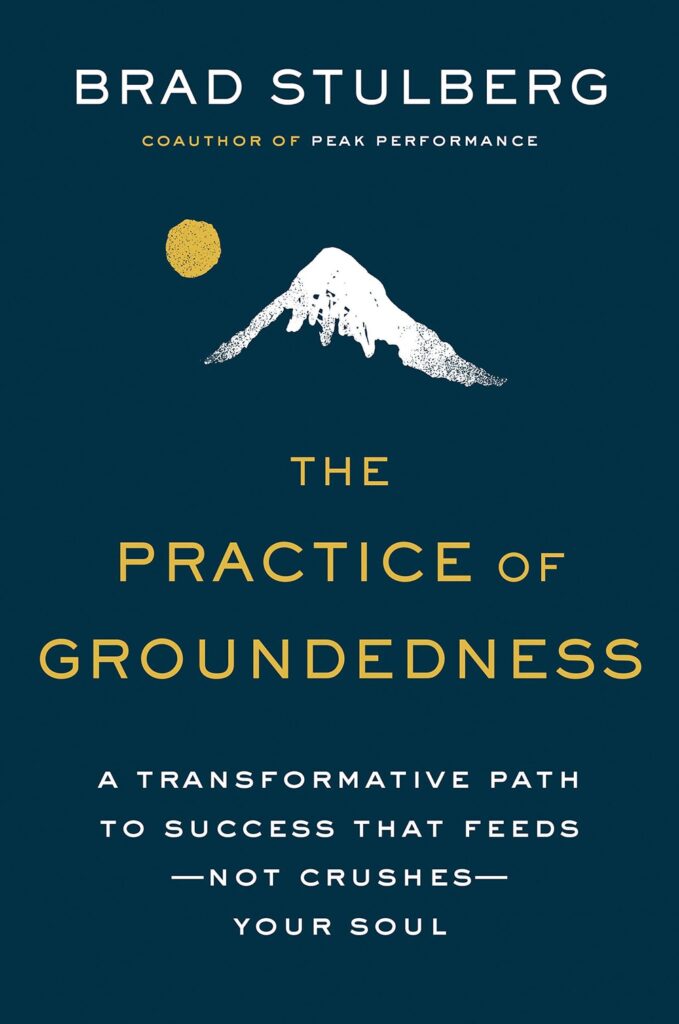Sharing my learnings from the book, The Practice of Groundedness by Brad Stulberg
The Practice of Groundedness by Brad Stulberg
In The Practice of Groundedness, bestselling author Brad Stulberg shares a healthier, more sustainable model for success. At the heart of this model is groundedness–a practice that values presence over rote productivity, accepts that progress is nonlinear, and prioritizes long-term values and fulfillment over short-term gain. To be grounded is to possess a firm and unwavering foundation, a resolute sense of self from which deep and enduring, not shallow and superficial, success can be found. Groundedness does not eliminate ambition and striving; rather, it situates these qualities and channels them in more meaningful ways.
Interweaving case studies, modern science, and time-honored lessons from ancient wisdom traditions such as Buddhism, Stoicism, and Taoism, Stulberg teaches readers how to cultivate the habits and practices of a more grounded life.

- October 2017. The author, Brad Stulberg, was in the middle of a long-distance drive. He was just sitting there, minding his own business when suddenly, an unprovoked thought hit him like a brick dropping from the sky. “You should just drive off the road and end it all right now,” it said. “Your family will be fine without you.” Deep down, he knew he didn’t really believe that thought. But he couldn’t shake it. What followed were four of the hardest hours of his life. And it wasn’t the first or last time he’d suffer an experience like this. Highly distressing, intrusive thoughts and feelings had become normal occurrences for him. This book is the story of what he went through, how he got out of it, and the lessons he learned along the way.
- A few years ago, Stulberg’s life seemed right on track. He was only 31, but already establishing himself as a well-respected expert on the science of human performance. But beneath the shiny surface of his external success, something dark was happening inside him. Seemingly out of nowhere, he developed a debilitating form of obsessive-compulsive disorder, or OCD. For nearly a year, he was almost constantly tormented by intrusive thoughts and feelings of despair, anxiety, and self-harm. The experience shook him to his core, and it led him to rethink the way of life he’d been practicing and preaching – a way of life he now calls heroic individualism.
- heroic individualism – It tells people that whoever they are and whatever they do, it’s never enough.
- Under the spell of heroic individualism, people feel compelled to tackle too many tasks at too fast a pace, under way too much pressure. The predictable result? Persistent feelings of burnout and unhappiness.
- under the spell of heroic individualism, people become fixated on their metaphorical canopies. They worry too much about their external achievements. As a result, they overstrain themselves, making them vulnerable to the winds of life.
- The antidote? be grounded. it means you feel a sense of inner strength, stability, and confidence. The word inner is crucial here. As a result, it doesn’t wax and wane with the ups and downs of success and failure. It stays constant – helping you stay calm and steady, even in the midst of turbulence.
- it’s more than just a feeling. When you’re grounded, you’re grounded in something – namely, the people, activities, and areas of life you care about the most. That’s why being grounded also means living in alignment with your values, and focusing your time and energy on what’s most important to you, whether it’s family, health, community, spirituality, or anything else.
- six core principles of groundedness
- Accept your present reality the way it is, so you can work on changing it into the future you desire.
- acknowledging the reality of a problem in a calm, nonreactive, neutral manner. The more neutral, the better.
- try to avoid the word should when evaluating your present reality
- stay present
- focus on what’s most important to you
- minimize distractions by turning off notifications, putting away unnecessary devices, and blocking off times for uninterrupted work or quality time with yourself or your loved ones.
- reassess your busyness by periodically asking yourself, Is what I’m doing really necessary?
- be patient
- biggest goals in life needs time
- adopt a more patient attitude, break your goals down into smaller steps, and then focus on just completing the one you’re on.
- true strength requires acknowledgment of weakness.
- It takes courage to be open and honest about your imperfections.
- It’s also liberating.
- surround yourself with a supportive community.
- embrace the spirit of community – the sense that we’re not alone, that we’re all in this together.
- keep your body moving.
- Exercise is therefore crucial to both physical and mental health.
- In working out, you learn to accept discomfort, stay present with your body, and be patient with making gradual progress toward your fitness goals.
- Accept your present reality the way it is, so you can work on changing it into the future you desire.


Leave a Reply